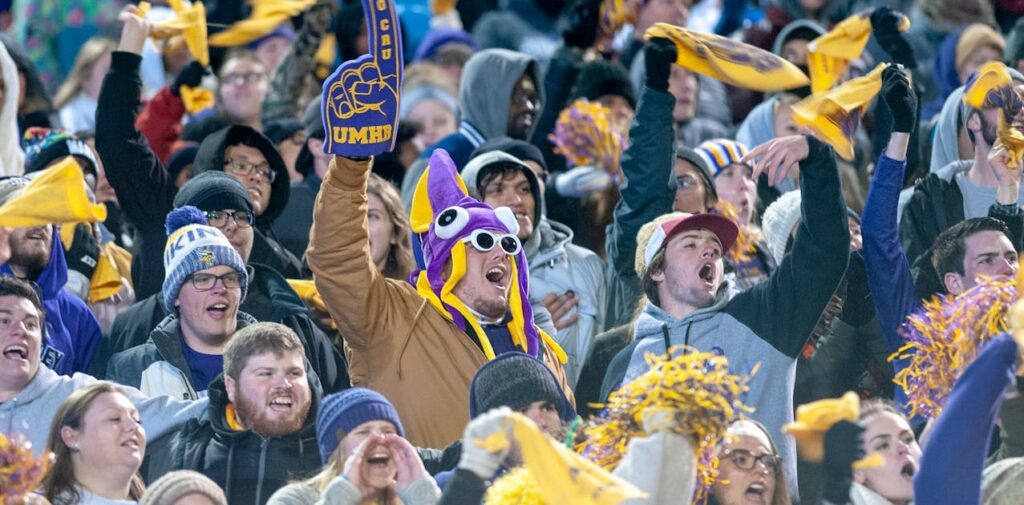By Julia Sutherlin // SWNS
Sports fans watch 120 games per year, according to a recent survey.
The poll of 2,000 American sports fanatics uncovered just how emotionally invested fans are, how much they pay to follow along and represent their teams, and how sports have given fans a return on their emotional and financial investments.
Conducted by Talker Research on behalf of SquadLocker, the survey also split sports fans into different categories depending on their level of commitment to their team or player.
A third of respondents (32%) said they’re moderate fans who watch a few sports games here and there, half (48%) labeled themselves as big fans who watch most games and a fifth (20%) are all-in and self-identified as raging fans who watch every single game they can.
But being a raging fan comes with a price tag. Raging fans reported they spend, on average, $879.40 on tickets to live sports games, concessions, apparel, collectibles, memorabilia and streaming services, per year.
Big sports fans said they’ll spend $593.80 and moderate sports fans reported spending $376.10 annually, on average.
When it comes to being present on the sidelines, fans said they’ll usually see about three live wins and two losses, per year.
And respondents estimated they’ve seen five one-of-a-kind, miracle live sports wins, with three quarters (74%) citing watching their favorite team win a live game as a favorite memory.
But not only is there a financial commitment to sports fandom, there’s an emotional commitment as well.
More than one in five fans (22%) have a pre-game ritual or tradition they do each time their favorite team or player competes, with raging fans being the most likely to participate in pre-game rituals (32%).
And while 35% reported their required pre-game traditions simply make them feel like a part of the team, one in three (31%) staunchly feel their pre-game ritual increases their team or player’s chances of winning.
When asked about their pre-game habits, many cited traditions like cookouts, flaunting team gear, tailgating, chanting, dancing and praying.
A few noteworthy respondents take it a bit further and reported lighting candles for their team, obsessively washing their hands and painting their bodies to ensure that their team wins.
“Many people follow along with pro athletes and partake in traditions because it’s a bonding experience and brings people together. Sports are rooted in community and often start when we’re young,” said Fletcher Jones, CEO of SquadLocker. “It is clear just how much sports mean to people by the emotional high they feel after a win and the emotional low after a loss. I think a lot of this comes from so many of us having participated in team sports during our formative years.”
Thirty-nine percent reported that if their team or player loses a match, they feel more sensitive than usual and more than one in 10 (14%) said their general enjoyment of life decreases.
Looking at how playing a sport growing up influences sports fandom, 71% of sports fans reported they played sports as a youth and 28% played in college.
And of those who played sports growing up, almost half (45%) said they dreamed of playing sports as a professional. For a quarter of those, this is still their dream.
And it turns out that turning on the TV or attending a match has a real-life impact on fans: 30% of respondents reported they’d like to pick a sport they used to play after watching the pros and a fifth (19%) even want to try a new sport.
Most popular sports fans are playing (either as an old hobby or a new skill) include basketball (41%), football (26%), baseball (22%) and tennis (16%).
“I think one of the most important results from this survey is how much passion sports fans have for their teams at every level. The support they give enhances their lives as well as the lives of the athletes,” said Kaycie Brown, athlete at 575 Volleyball, a youth sports organization. “We love the family and friends that come and cheer us on and even the ones who watch online and cheer us on from their homes. All athletes need a support system, and the fans play a very large role. Fan support builds confidence and plants seeds for success.”
Survey methodology:
This random double-opt-in survey of 2,000 American sports fans was commissioned by SquadLocker between May 24 and May 29, 2024. It was conducted by the market research company Talker Research, whose team members are members of the Market Research Society (MRS) and the European Society for Opinion and Marketing Research (ESOMAR).
